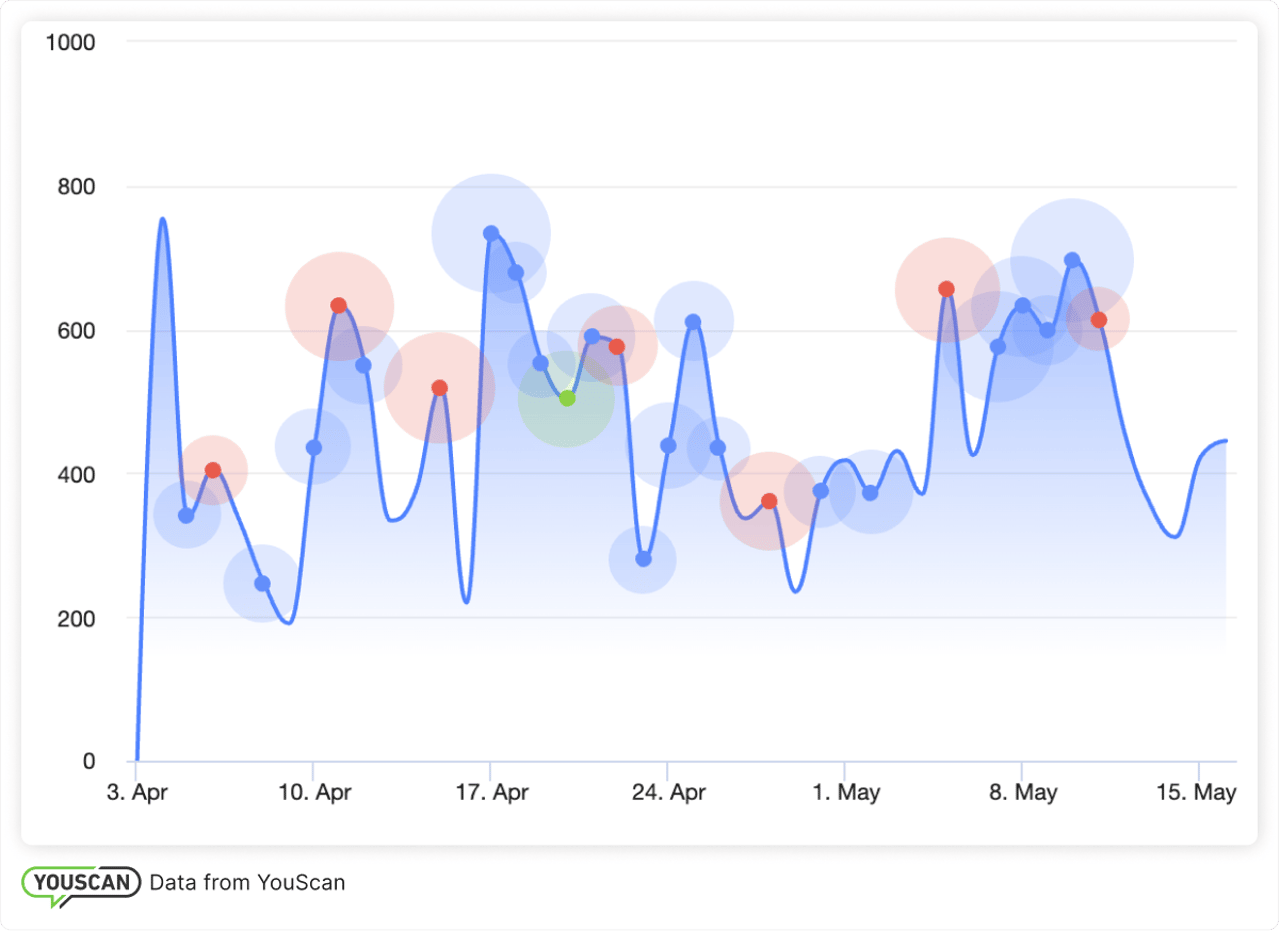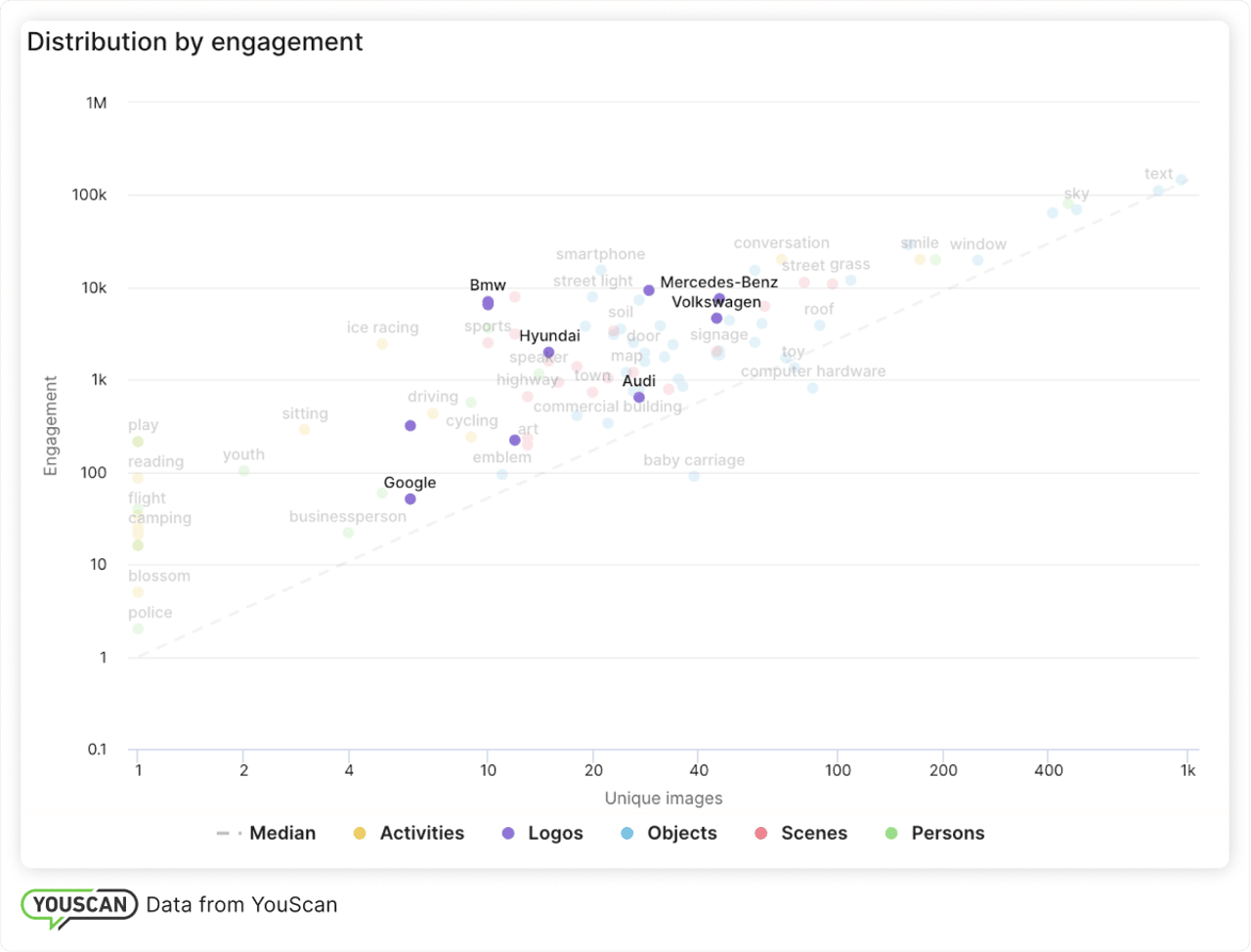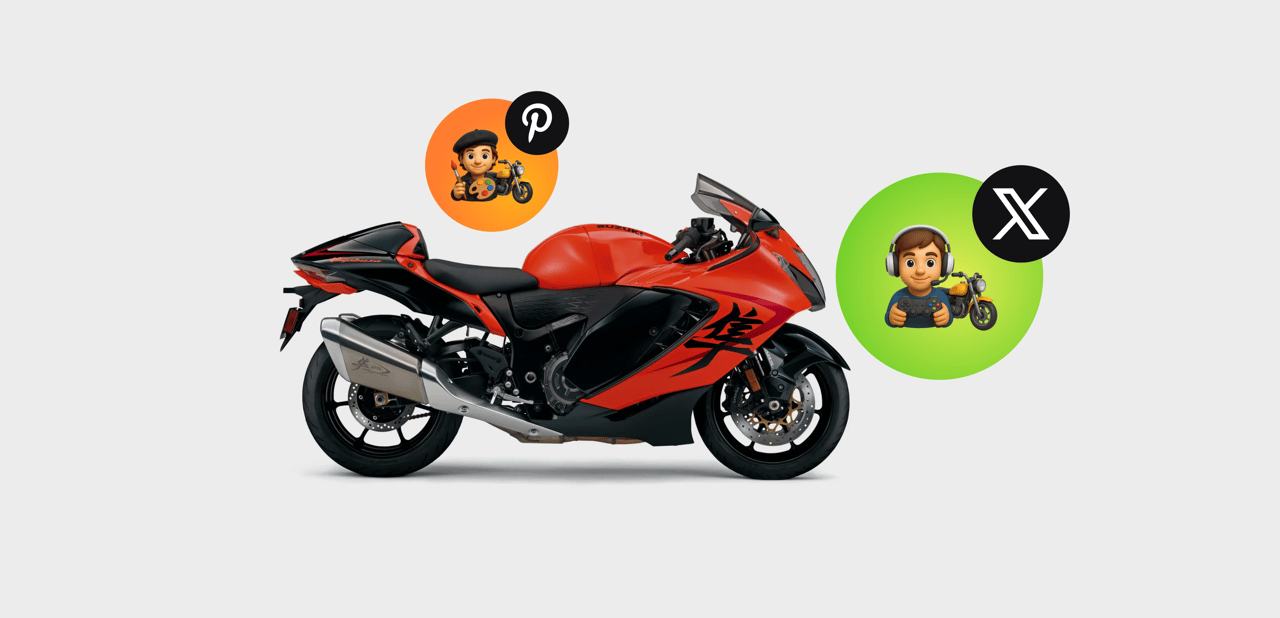What Social Listening with Insights Copilot reveals about the perception of EV batteries

There is a strong consensus that the future of mobility will have to be far less based on individual cars and that the residual and irreducible portion of individual car traffic has to be decarbonised – electrified, since no other technological infrastructure will be ready soon enough.
With Social Media Listening, we can quickly and comprehensively analyse a wide range of data to gain valuable insights into consumer opinions about this topic.
For both strategic and pragmatic reasons, we'll focus our research on Germany – probably the European nation where the automotive industry has the most to gain, or lose, from this change.
Remember that one-third of all European automotive employees are German and that Germany produces the majority of cars in Europe. So, this is a topical issue in Germany and of concern to the motor industry.
We used YouScan Social Listening platform, and their newly released Insights Copilot, GhatGPT powered assistant, to comprehend the ongoing conversations dynamics better and get a real-time sense of the social web.
Here are the three key points we learned that were deepened and enriched with YouScan.
#1 Disinformation & misinformation are everywhere
This has now become a basic principle for every major online conversation: misinformation, sometimes flanked by deliberate disinformation content.
The sophistication of current misinformation/disinformation strategies makes it hard for Social Listening software to identify them automatically, but quantitative indicators make it possible (for example, by identifying duplication of distinctive terms, abnormal accounts of bots among retweeters, abnormal peaks, etc.).
YouScan features a useful indicator of "trends", based on similar narratives with the same pattern:


In our case, three main topics appear on our radar:
The cost of the battery, mentioned in 25% of all conversations: its impact on EV cost, and who's profiting from it.
Lithium (and Cobalt, Nickel, etc.) mentioned in 20% of all conversations: the possible shortage of lithium, and how it can be optimised, or replaced (by Sodium-ion), the human cost of its extraction.
The issue of recycling mentioned in 6.5 % of all conversations: what hasn't been done, Tesla models being "irreparable", how to boost the second-hand market, etc.
A range of misleading arguments crosses all these trends:
The carbon footprint of electric cars is higher than ICE, even if we consider the whole lifespan of the EV, as here on Telegram, quoting the famous automotive engineer, Fritz Indra.
Lithium dependency is a fact and a trap (as implied here).
E-Cars burn, here on TikTok: " the more electric cars we have, the more fires will happen."
EV will destroy the German automotive industry, as stated here on YouTube.
All of these arguments have been undermined or fully debunked (Euronews, Carbone4, the European Union, etc.), but the point here is to underline how common, recurring and "obvious" these narratives are.
Note, however, that resistance or "antibodies" to disinformation grow as well as disinformation.
In the narrative of "burning" e-cars, marked by a viral tweet in Germany at the beginning of April (on an alleged "exploding e-car", the video reaching viral heights of 1 Million views), users have very quickly confronted the author with evidence of his lies, and the Correctiv Forum, a non-profit and grassroots organisation, has published a whole debunking article.
#2 Telegram is the first (monitored) provider of contents
YouScan reveals that the leading publisher of posts related to E-Cars battery on the German social web is Telegram: 39 % of all content.
Well, not so "social", since this category of posts belong to what has been named ten years ago "Dark Social": all the private messages (WhatsApp, Messenger, SMS etc.) moulding our online environment, escaping all kind of measures and analysis, and presumably the major location for sharing content.
YouScan provides us with an interesting glimpse into dark social media through Telegram channels – the tip of the iceberg but already the largest source in volume.
And last month, these channels echoed a statement from a notorious federal German administrative judge, who, speaking the "truth", said that e-cars would mean "more coal plants, more fossil energy, more CO2, more climate change and no less", like here, here or there, using an article from Junge Freiheit (right conservative media).
Others focused on the lithium shortage (here or here), relying on solid media like Der Spiegel about Chile's decision to nationalise its lithium mine, and Handelsblatt.
There are concerns, too, about the weight of e-cars.
That alone says a lot. Statistic data confirms the strong bias of the largest source of data on the German social web (seltene Erden = rare earth elements).


In a word, on Telegram, the contents about EV batteries on the German (dark) social web is intensely worried and focuses on the issues of lithium or cobalt, and this without taking into account the new realities of EV Batteries nor even mentioning what oil-dependency means.
#3 How Insight Copilot, the first AI assistant for Social Listening, helped us sort the data
Now, it is time for us to call on the help of Insights Copilot, the first ChatGPT-powered conversational assistant for Social Listening, to see what it would conclude when asked about the insights from Telegram, the first content source on our scope.
First, Copilot can – in a second – give an adequate (and confirmed) analysis of the tone and topics according to the source:
"YouTube is more positive and tends to focus more on industry and technological advancements, (while) Telegram mentions have a more critical and sceptical tone towards e-car batteries."
Let's dig deeper with Insights Copilot:
"A variety of topics, such as battery technology, charging infrastructure, and environmental and ethical concerns, as well as comparisons with traditional vehicles, are the main themes of discussion (in Telegram). Concerns about the environmental impact of e-car batteries, the need for more charging infrastructure, and the negative and critical tone towards e-car batteries are the most common insights. Additionally, discussions about potential dangers and the focus on the environmental impact of battery production are themes that dominate the discussions."
Well, Insights Copilot is completely right.
However – and this is why Copilot is your best friend to help sort your data and get clues quickly, but should not escape human oversight – the very polite tone of Copilot smoothes out all kinds of judgements, and the AI programme can be fooled – as all of us – by the editorial approach of Telegram Channels: no strings of rageful emojis, but articulate analysis quoting very often very real figures. In-Depth human analysis should never be abandoned when digging into sensitive matters.
It is clear that all kinds of extrapolated controversies, forged or even fake data, personal distrust for change disguised as objective analysis, and misleading information on one of the most critical tools to decarbonise our car traffic (after lowering it) are feeding social and political inertia.
"Emphasising the downsides of climate action (here EV batteries) in these ways thus deflects attention from the harm they avoid (ICE and oil impact on environment)" belongs to the "discourses of climate delay" as summarised by a study from Cambridge University.
What Social Listening results teach us here is the critical need for communicators and activists to produce and share transparent, scientific source-based information on EV batteries, in order to counter false narratives and leverage positive sources of discussions.
And Insights Copilot also jumped by itself on that recommendation:
"Overall, the German social web has mixed opinions about EV batteries, with some sources highlighting their potential benefits and others expressing concerns about their environmental and social impact. There is a need for more reliable and accurate information about EV technology and its impact on the environment and society."
Addenda
Curious about how brands are impacting this conversation?
20% of all content about EV batteries mentions a brand – our query tested >50 brands, including all German manufacturers. 80% of the content does not.
Except for Tesla, whose battery policy is perceived as distinctive, consumers don't confront brands that much on the performance of their batteries. You won't find many debates about the differences between Peugeot batteries vs BMW batteries online, as though it didn't matter, even though EV batteries are a topic in itself.
A short overview on Visual Insights – YouScan’s social image analysis suite – confirms that, even if the mention of brands might lead to more engaging content, this remains insignificant.


What does our friend, Insights Copilot, think about it?
"There is no sufficient information to answer whether consumers make a difference between different car brands when talking about e-car batteries."
That's right.




